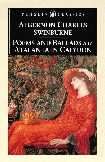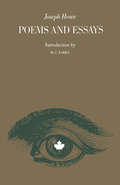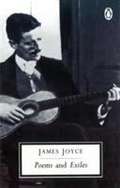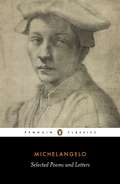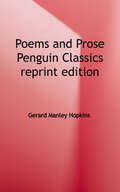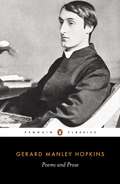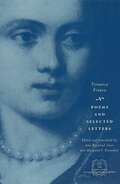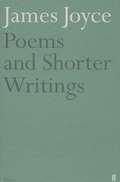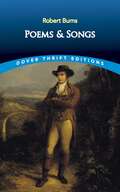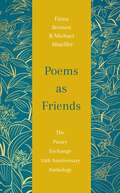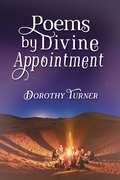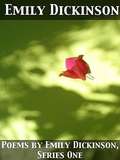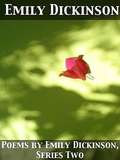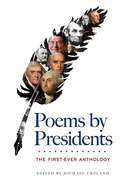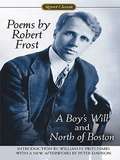- Table View
- List View
Poems and Ballads & Atalanta in Calydon
by Algernon Charles SwinburneThis volume brings together Swinburne's major poetic works, ATALANTA IN CALYDON (1865) and POEMS AND BALLADS (1866). ATALANTA IN CALYDON is a drama in classical Greek form, which revealed Swinburne's metrical skills and brought him celebrity. POEMS AND BALLADS brought him notoriety and demonstrates his preoccupation with de Sade, masochism, and femmes fatales. Also reproduced here is 'Notes on Poems and Reviews', a pamphlet Swinburne published in 1866 in response to hostile reviews of POEMS AND BALLADS.
Poems and Essays
by Joseph Howe M. G. ParksThis volume, containing a selection of the poetry and prose of Joseph Howe, presents various aspects of a fascinating man who few Canadian know as other than the 'tribune of Nova Scotia' and a political giant of colonial times. Yet Howe was also a writer, and a good one. His intuitive grasp and pragmatic skill in political affairs were combined with wide-ranging intellectual curiosity, strong moral idealism, and a lively imagination. He revealed a vigorous strength in journalism and politics, in public life in general, and in his prose. His poetry admittedly was minor and colonial — he cultivated eighteenth-century verse models and habits of diction, which made him a second-generation Romantic in attitude and tone rather than in style — and its merit, according to David Munroe, Dalhousie Review, XX, 1941, 'lies principally in the deep sincerity which is characteristic of all good verse.' However, to understand the man and his times it is essential to understand the full extent of his endeavours; hence the significance of this book. The selections in this volume were assembled after Howe's death by his ninth child, Sydenham. They include the unfinished poem 'Acadia,' various serious and sentimental poems, five essays originally written and delivered as speeches, and a moral tale entitled 'The Locksmith of Philadelphia.'
Poems and Exiles
by James Joyce J. C. C. MaysIt is only James Joyce's towering genius as a novelist that has led to the comparative neglect of his poetry and sole surviving play. And yet, argues Mays in his stimulating and informative introduction, several of these works not only occupy a pivotal position in Joyce's career; they are also magnificently assured achievements in their own right.
Poems and Letters: Selections, with the 1550 Vasari Life
by MichelangeloMichelangelo Buonarroti (1475-1564) is universally celebrated as one of the greatest artists of all time, yet iconic Renaissance creator was also a prolific and gifted poet. The verses collected here are primarily devoted to love and religion. Intense and passionate, the love poems focus on two figures: Tommaso de Cavalieri and Vittoria Colonna; with the sonnets and madrigals dedicated to de Cavalieri revealing a highly charged, homoerotic fervour - previously obscured in the original versions. Michelangelo's later religious poetry moves away from his earlier wordly concerns, while his letters provide a fasicnating insight into his fanily relations and day-to-day life as a working artist. The result is a revealing picture of one of the towering figures of the Renaissance.
Poems and Prose
by Gerard Manley HopkinsDazzling in its prosodic innovations, such as the 'sprung rhythm' he pioneered, and wide-ranging in its complexity and metaphysical interest. The Penguin Classics edition of Gerard Manley Hopkins's Poems and Prose is selected and edited with an introduction by W.H. Gardner. Closer to Dylan Thomas than Matthew Arnold in his 'creative violence' and insistence on the sound of poetry, Gerard Manley Hopkins was no staid, conventional Victorian. On entering the Jesuit order the age of twenty-four, he burnt all his poetry and 'resolved to write no more, as not belonging to my profession, unless by the wishes of my superiors'. The poems, letters and journal entries selected for this edition were written in the following twenty years of his life, and published posthumously in 1918. His verse is wrought from the creative tensions and paradoxes of a poet-priest who wanted to evoke the spiritual essence of nature sensuously, and to communicate this revelation in natural language and speech-rhythms while using condensed, innovative diction and all the skills of poetic artifice.
Poems and Prose (Everyman's Library Pocket Poets Ser.)
by Gerard HopkinsCloser to Dylan Thomas than Matthew Arnold in his 'creative violence' and insistence on the sound of poetry, Gerard Manley Hopkins was no staid, conventional Victorian. On entering the Society of Jesus at the age of twenty-four, he burnt all his poetry and 'resolved to write no more, as not belonging to my profession, unless by the wishes of my superiors'. The poems, letters and journal entries selected for this edition were written in the following twenty years of his life, and published posthumously in 1918. His verse is wrought from the creative tensions and paradoxes of a poet-priest who wanted to evoke the spiritual essence of nature sensuously, and to communicate this revelation in natural language and speech-rhythms while using condensed, innovative diction and all the skills of poetic artifice.
Poems and Selected Letters (The Other Voice in Early Modern Europe)
by Veronica FrancoVeronica Franco (whose life is featured in the motion picture Dangerous Beauty) was a sixteenth-century Venetian beauty, poet, and protofeminist. This collection captures the frank eroticism and impressive eloquence that set her apart from the chaste, silent woman prescribed by Renaissance gender ideology. As an "honored courtesan", Franco made her living by arranging to have sexual relations, for a high fee, with the elite of Venice and the many travelers—merchants, ambassadors, even kings—who passed through the city. Courtesans needed to be beautiful, sophisticated in their dress and manners, and elegant, cultivated conversationalists. Exempt from many of the social and educational restrictions placed on women of the Venetian patrician class, Franco used her position to recast "virtue" as "intellectual integrity," offering wit and refinement in return for patronage and a place in public life. Franco became a writer by allying herself with distinguished men at the center of her city's culture, particularly in the informal meetings of a literary salon at the home of Domenico Venier, the oldest member of a noble family and a former Venetian senator. Through Venier's protection and her own determination, Franco published work in which she defended her fellow courtesans, speaking out against their mistreatment by men and criticizing the subordination of women in general. Venier also provided literary counsel when she responded to insulting attacks written by the male Venetian poet Maffio Venier. Franco's insight into the power conflicts between men and women and her awareness of the threat she posed to her male contemporaries make her life and work pertinent today.
Poems and Shorter Writings
by James Joyce A. Walton Litz Richard Ellmann John Whittier-FergusonThis collection brings together all the poems published by James Joyce in his lifetime, most notably Chamber Music and Pomes Penyeach. It also includes a large body of his satiric or humorous occasional verse, much of which is fugitive and little known to the general reader. In addition, the volume provides the text of the surviving prose Epiphanies, Giacomo Joyce - the fascinating Trieste notebook that Joyce compiled while finishing A Portrait of the Artist and beginning Ulysses, in which he first explored the world of his autobiographical novel.
Poems and Songs (Dover Thrift Editions: Poetry Ser.)
by Robert BurnsTreasury of 43 works including: "The Cotter's Saturday Night," "To a Mountain Daisy," "To a Mouse," "To a Louse," "Tam o' Shanter," "Comin' Thro' the Rye," "I'm Oe'r Young to Marry Yet," "O, Lay Thy Loof in Mine, Lass," and "O, Wert Thou in the Cauld Blast." Alphabetical lists of titles and first lines. Extensive glossary.
Poems as Friends: The Poetry Exchange 10th Anniversary Anthology
by Fiona Bennett Michael ShaefferThe Poetry Exchange is an award-winning podcast and project that celebrates the role poetry plays in people's lives. In their first anthology, Fiona Bennett and Michael Shaeffer draw on ten years of archival material to bring together a collection of poems chosen by readers that know them as friends, presented alongside their personal stories of connection. Featuring Brian Cox on John Clare, Andrew Scott on George Herbert, Maxine Peake on Tony Harrison and many more, in this gathering of poems you can reacquaint yourself with old friends, perhaps make some new ones, and enjoy the companionship poetry can offer us. Friends that offer connection and solidarity.Friends that help us wrestle with difficult things.Friends that name our experiences.Friends that comfort and help us move forward.Friends we admire.
Poems as Friends: The Poetry Exchange 10th Anniversary Anthology
by Fiona Bennett Michael ShaefferThe Poetry Exchange is an award-winning podcast and project that celebrates the role poetry plays in people's lives. In their first anthology, Fiona Bennett and Michael Shaeffer draw on ten years of archival material to bring together a collection of poems chosen by readers that know them as friends, presented alongside their personal stories of connection. Featuring Brian Cox on John Clare, Andrew Scott on George Herbert, Maxine Peake on Tony Harrison and many more, in this gathering of poems you can reacquaint yourself with old friends, perhaps make some new ones, and enjoy the companionship poetry can offer us. Friends that offer connection and solidarity.Friends that help us wrestle with difficult things.Friends that name our experiences.Friends that comfort and help us move forward.Friends we admire.
Poems by Divine Appointment
by Dorothy TurnerPoems by Divine Appointment are poems with purpose. They were written to inspire and to stir up your spirit. You will find some of these poems are quite long while others are very short. Nevertheless, each poem has a message that&’s clear and get straight to the point leaving nothing to the imagination. These poems are power packed, and I hope every reader will experience the presence of God through reading these poems. Yes, Poems by Divine Appointment are mine, but they came from God&’s creative mind. Now allow me to give you a little peek inside of the book with this poem. What&’s In the SeaI&’ve seen deep in the sea,Things we are about to see.There are a lot of things in the sea,But it&’s nothing that I can&’t see.Fishermen are on the seaTrying to catch what they can&’t see.The birds of the air; the fish of the seaWill make do with what they see.Don&’t be disturbed by what you see,It&’s just the beginning of what it&’s going to be.I&’ve seen deep in the sea,Trouble stirring in the sea. Memphis, TennesseeWill soon be nothing to see.Things are stirring up in the sea,Things you are about to see.When I looked across the sea,I saw things I didn&’t want to see.I&’ve been fishing in the seaTo catch what the fishermen couldn&’t see.Who made the sea?The one you cannot see.I&’ve seen deep in the sea,Things that&’s about to be.Memphis, TennesseeIs about to be nothing to see.
Poems by Emily Dickinson, Series One
by Emily DickinsonpubOne. info present you this new edition. THE verses of Emily Dickinson belong emphatically to what Emerson long since called "the Poetry of the Portfolio, "- something produced absolutely without the thought of publication, and solely by way of expression of the writer's own mind. Such verse must inevitably forfeit whatever advantage lies in the discipline of public criticism and the enforced conformity to accepted ways. On the other hand, it may often gain something through the habit of freedom and the unconventional utterance of daring thoughts. In the case of the present author, there was absolutely no choice in the matter; she must write thus, or not at all. A recluse by temperament and habit, literally spending years without setting her foot beyond the doorstep, and many more years during which her walks were strictly limited to her father's grounds, she habitually concealed her mind, like her person, from all but a very few friends; and it was with great difficulty that she was persuaded to print, during her lifetime, three or four poems.
Poems by Emily Dickinson, Series Two
by Emily DickinsonpubOne. info present you this new edition. The eagerness with which the first volume of Emily Dickinson's poems has been read shows very clearly that all our alleged modern artificiality does not prevent a prompt appreciation of the qualities of directness and simplicity in approaching the greatest themes, - life and love and death. That "irresistible needle-touch, " as one of her best critics has called it, piercing at once the very core of a thought, has found a response as wide and sympathetic as it has been unexpected even to those who knew best her compelling power. This second volume, while open to the same criticism as to form with its predecessor, shows also the same shining beauties.
Poems by Presidents: The First-Ever Anthology
by Heidi Gagnon"Well-written, thoroughly researched, and impeccably organized, Poems by Presidents explores an intriguing and unexpected side to many American presidents: they wrote poetry! In this excellent anthology of presidential poems, Michael Croland offers us a new way to celebrate some of our most celebrated leaders." —Susan Katz, author of The President’s Stuck in the Bathtub. This first-ever anthology features poems by eleven presidents who, through good times and bad, turned to poetry to express themselves. This compelling collection brings presidents’ literary pursuits to light, unveiling their deepest thoughts and emotions. Highlights include George Washington’s teenage romantic yearnings, Thomas Jefferson’s death-bed adieu, John Quincy Adams’s sonnet memorializing his father, Abraham Lincoln’s mockery of the Confederacy, Woodrow Wilson’s humorous limericks, Warren G. Harding’s steamy love poems to his mistress, and Ronald Wilson Reagan’s existential reflections. Appendixes explore additional presidents who wrote poetry, misattributions, prose formatted as verse, and fondness for poetry. Poems by Presidents is a rewarding resource for poetry lovers and readers interested in presidential biographies and American history. "From Madison’s collegiate satires to Harding’s racy romantic rhymes, this anthology has something to surprise and delight even the most dedicated history buff. It will teach you something about our presidents’ personal lives, their poetic talents, and even their political ambitions." —Craig Fehrman, author of Author in Chief "This distinctive collection is a pleasure to read and enjoy. It provides another dimension to our awareness of the personalities and talents of many of our presidents." —Fred Kaplan, author of His Masterly Pen: A Biography of Jefferson the Writer "Michael Croland has assembled an interesting and unexpected anthology of presidential poetry. Poems by Presidents leaves the reader with a better understanding of the concealed humanity often buried within the seemingly stoic men who have held our nation’s highest office." —Michael B. Costanzo, author of Author in Chief "This unique collection by US presidents, featuring poems ranging from spiritual to humorous to erotic, is surprising, fascinating, and humanizing." —Marilyn Singer, author of Rutherford B., Who Was He?: Poems about Our Presidents "A wonderful volume, full of keen insights into a wide array of American presidents. . . . The superb focus of this book brings fascinating details to light." —Jonathan Gross, editor of Thomas Jefferson’s Scrapbooks
Poems by Robert Frost
by Robert Frost100th Anniversary Edition Poems by Robert Frost A Boy’s Will and North of Boston The publication of A Boy’s Will (1913) and North of Boston (1914) marked the debut of Robert Frost as a major talent and established him as the true poetic voice of New England. Four of his volumes would win the Pulitzer Prize before his death in 1963, and his body of work has since become an integral part of the American national heritage. This is the only edition to present these two classics in their original form. A Boy’s Will introduced readers to Frost’s unmistakable poetic voice, and in North of Boston, we find two of his most famous poems, "Mending Wall” and "The Death of the Hired Man. ” With an introduction by distinguished critic and Amherst professor William H. Pritchard and an afterword by poet and critic Peter Davison, this centennial edition stands as a complete and vital introduction to the work of the quintessential modern American poet. Introduction by William H. Pritchard Afterword by Peter Davison .
